Miners' strike: Valley community and gay activists' enduring friendships
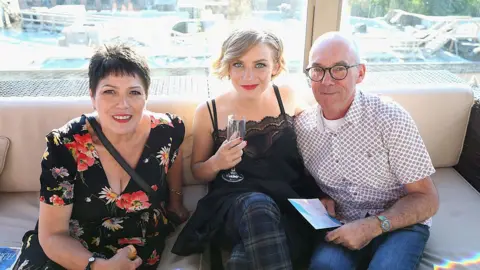 Getty Images
Getty ImagesAlmost four decades have passed since the 1984 miners' strike but the unlikely friendships forged between a south Wales community and gay activists from London are as strong as ever.
The 2014 film Pride told how group Lesbians and Gays Support the Miners (LGSM) raised thousands for striking miners in the Dulais, Neath and Swansea valleys.
A new documentary has captured how what began with a shared hatred of the Thatcher government has grown into long-lasting friendships.
Photographer Roger Tiley spent a year filming everyday life in the upper Dulais Valley in Neath Port Talbot.
His documentary Pride in our Valley focuses on the community as they witness the closure of their opencast mine, once the lifeblood of the valley.
He also captures the lifelong bond between members of LGSM and the former miners on a visit to Swansea Pride.
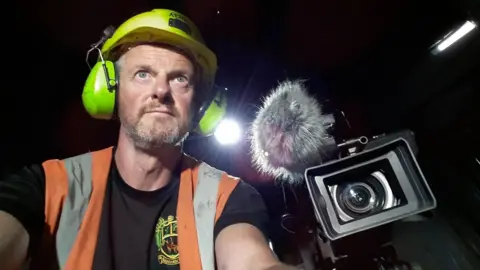 Roger Tiley
Roger TileySian James, one of the main characters in the film Pride who was played by Jessica Gunning, said: "We've celebrated highs and difficult times with each other.
"We've become friends with their families and friends."
The strike was to change Sian's life in more ways than she could have known - politicising her to the extent that she entered parliament, becoming the MP for Swansea East between 2005 and 2015.
Recalling life before the strike, she said: "I was a very happily married wife and mother… a typical valleys' wife… the most important thing in my life was whether my kids were going to school, well-dressed, were polite and well-raised and that my brass was the cleanest brass in the street and my nets were the whitest."
Then on 6 March 1984, the National Coal Board (NCB) announced it intended to close 20 pits around the UK with the loss of 20,000 jobs.
Six days later Arthur Scargill, president of the National Union of Mineworkers (NUM), called a national strike in response.
An important source of support for the striking miners came from the women in their own communities, who organised soup kitchens and distributed food parcels.
LGSM was formed four months into the year-long strike and Sian said most people in her community were mostly grateful when they offered their support and much-needed fundraising.
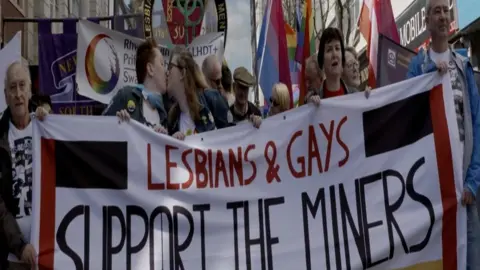 Roger Tiley
Roger TileyBut some of the men had not encountered openly gay people before and weren't so sure.
"I said to my cousin 'are you so irresistible that someone's going to jump on you?'," laughed Sian.
"The women were ready to reach out."
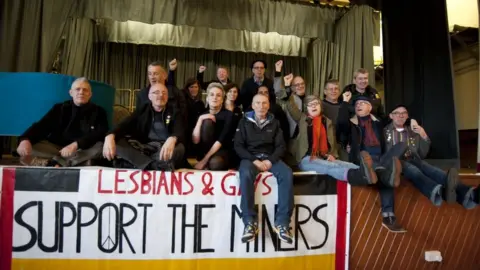 Roger Tiley
Roger Tiley'Good buddies'
Mike Jackson, the secretary of LGSM who is portrayed by Joe Gilgun in Pride, agreed.
"It was a mining community for God's sake and nearly 40 years ago so we didn't expect them to be the zeitgeist for human sexual understanding but, in fact, it turned out they discussed us long before we went down to stay with them.
"The women in particular - gay men often find this - the women had particularly championed the cause to the men.
"The men would be doing a bit of bawdy giggling at the prospect of these gay people coming to descend on their village and the women weren't having it - they just said 'these people have the decency to be supporting us… we want to extend the hand of friendship to them just as we would with anybody else'."
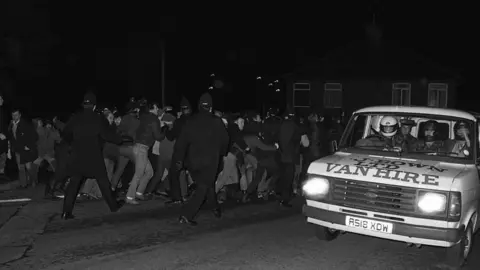 Roger Tiley
Roger TileyAfter spending time in the miners' homes, attending meetings together, socialising and walking in the surrounding countryside the men eventually let their guards down too.
"Almost overnight we became their favourites because gay men are quite good at drinking beer," Mike joked.
"By the end of that first night at the Onllwyn Miners' Welfare [Hall] we turned from being political comrades into good buddies.
"We became best of friends and have remained so ever since."
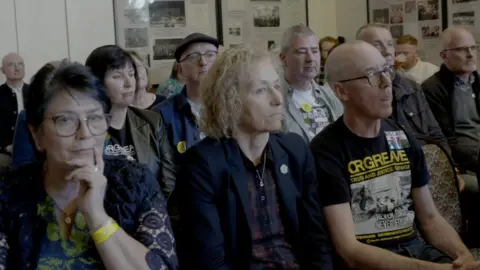 Roger Tiley
Roger TileyHe said with the passing of time LGSM's contact with the mining community had eventually whittled down to the ritual exchange of Christmas cards - but friendships were reignited by the 2014 film Pride.
Since then there have been many meet-ups, sadly some funerals and even a recent wedding - "all that kind of family stuff," he said.
During the Covid pandemic, like much the rest of the country, they got together to celebrate birthdays over Zoom.
Mike said to him the friendships meant "love, comradeship and a passion and cause shared".
"When you've been involved in in a fight like that, it's something that you take with you for the rest of your life because it's such a remarkable and emotional thing to do with its up and downs," he said.
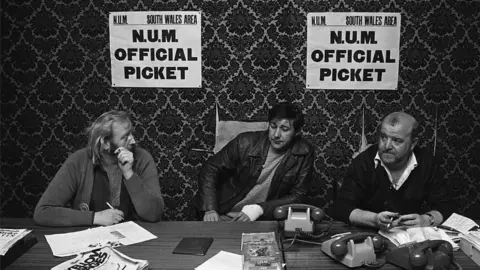 Roger Tiley
Roger TileyAfter 364 days on strike, the miners returned to work defeated - but the community was quick to repay the support they had been shown by LGSM.
"People from those three valleys went out collecting for Aids charities, they wrote letters to the local press in the area explaining what HIV and Aids was all about to try and quell prejudice," said Mike.
Sian said her community had more in common with the gay activists than people may assume.
"When you have this capacity to sit down with people and listen to how they came into political action - those things made you similar, not dissimilar," she said.
"We spoke about the discrimination they faced, the lack of opportunity, the fear of people finding out about their sexuality and hiding their sexuality from family and friends and that's when you started to feel their pain really."
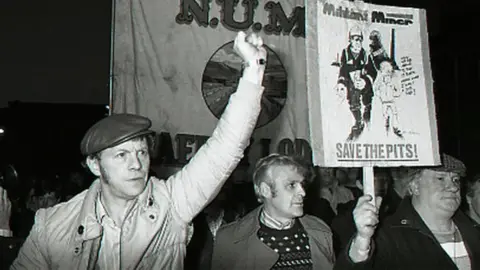 Roger Tiley
Roger TileyPhotographer Roger, who himself grew up in a south Wales mining community, Crosskeys in Caerphilly county, was also touched by how the community welcomed him while he was making the documentary.
"The people were just so welcoming and I just became part of the community really quickly… people forgot about the camera being there really," he said.
"I think all former mining communities in the valleys have this sense of belonging, and to be very proud of where they come from - myself included."
Roger has been photographing miners since 1978 and when the miners' strike began in 1984 he was asked to take photos by the Sunday Times.
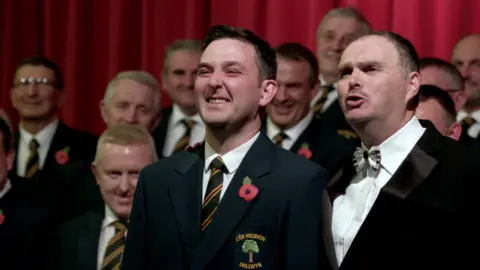 Roger Tiley
Roger Tiley"It's very much a culture - the rugby club, the church, everybody knows each other," he said.
"I think when the Lesbians and Gays Support the Miners came down in the '80s they were even more scared than the local people," he said.
"Now they come down and they are very welcome, they feel like they're at home."

- HAYLEY PEARCE PODCAST: Tackling the issues that make the group chats go off
- SAM SMITH PRESENTS STORIES OF HIV: From Terrence Higgins to today

